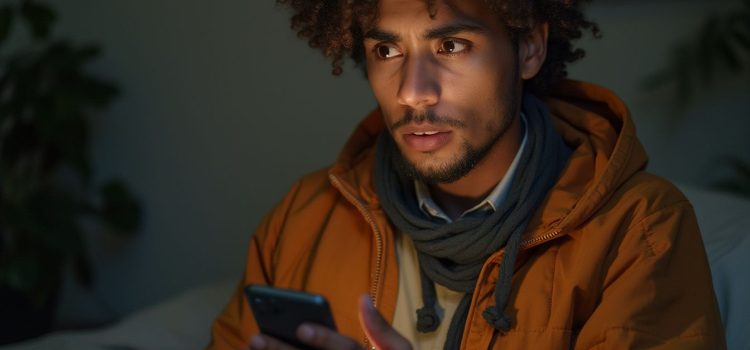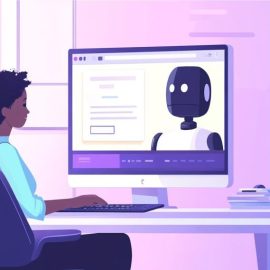
This is a free excerpt from one of Shortform’s Articles. We give you all the important information you need to know about current events and more.
Don't miss out on the whole story. Sign up for a free trial here .
Why is TikTok dangerous? What’s really happening when millions of people get their news from the platform? How can it shape our understanding of world events without us even realizing it?
TikTok’s evolution from an entertainment platform to a primary news source for Gen Z has sparked intense debate among journalists and media experts. The platform’s ability to deliver quick, engaging content comes with serious concerns about misinformation, bias, and potential manipulation.
Keep reading to discover why TikTok is dangerous as a news source and what that means for the future of information sharing.
Why TikTok Is Dangerous
TikTok isn’t just for viral trends anymore. The short-form video app has become Gen Z’s preferred news source—and journalists are worried about what comes next. So, why is TikTok dangerous in the minds of many? While the platform has opened new avenues for diverse perspectives and real-time news sharing, it has also become a breeding ground for misinformation, biased content, and political disinformation.
More and more Americans are getting their news on TikTok. The shift from traditional news outlets to social media platforms marks a fundamental change in how information spreads. It brings both new opportunities to get people to engage with current events—and serious concerns about the quality of the information they’re getting on TikTok. Ahead, we’ll explore TikTok’s emerging role as a news platform, examine its appeal as a source of information to younger audiences, and consider the challenges it poses for reliable news consumption.
Despite its advantages, TikTok’s emergence as a news source raises critical concerns about the credibility and reliability of the information available on the platform. While TikTok has opened new avenues for diverse perspectives and real-time news sharing, it has also become a breeding ground for misinformation, biased content, and political disinformation, including content with outright falsehoods.
Many TikTok users acknowledge that not everything they see on the platform is trustworthy. And many claim to approach content with healthy skepticism. However, the platform’s rapid-fire delivery of information, combined with its highly engaging format, can make it challenging to maintain that critical distance. The same algorithm that makes content feel personally relevant can create echo chambers, where opinions are presented as facts and emotional appeals override critical thinking. The features that make TikTok engaging—its quick pace, emotional resonance, and personalized feed—can also make it harder for users to think critically about the information they’re consuming and to avoid being “lazy” with their thinking.
That tendency to let critical thinking slide becomes even more problematic when you consider TikTok’s broader credibility issues. The platform that’s reshaping how young people understand world events comes with serious reliability concerns that extend beyond individual users’ habits. Because TikTok users often place more trust in a creator’s personal story about a news event than in traditional journalism coverage of the same story, a first-person account of a protest might feel more authentic than a newspaper report. But this preference for personal narratives over verified reporting contributes to TikTok’s tendency to spread misinformation rapidly.
Also troubling are questions about TikTok’s content moderation. Researchers have found evidence that the platform’s algorithm favors content aligned with Chinese foreign policy while burying posts critical of China. This selective amplification doesn’t just shape what users see—it actively molds their understanding of global events. When users repeatedly encounter manipulated or selectively curated content, they may gradually lose both the ability and the motivation to separate fact from fiction.
Where Do We Go From Here?
TikTok’s transformation into a major news source represents more than just a shift in how we consume information. It signals a fundamental reimagining of what news looks like in the digital age. The question isn’t whether social media will continue to shape news consumption, but how we can harness its benefits while protecting ourselves from its pitfalls.
The stakes are particularly high for younger users, who increasingly form their worldview through the lens of social media. As TikTok’s influence grows, so does the urgency for users to develop sophisticated media literacy skills. This means learning to spot red flags in viral videos, understanding how algorithms can create echo chambers, and recognizing when emotional appeals are masking weak evidence. The platform’s potential influence from the Chinese government adds another layer of complexity. When an algorithm can subtly shape global narratives by promoting or suppressing certain viewpoints, users need to be especially vigilant about questioning what they see—and what they don’t see—in their feeds.
Experts think the solution isn’t to abandon TikTok as a news source but to approach it as part of a broader information diet. By cross-referencing information across multiple platforms and sources, users can develop a more complete and nuanced understanding of the world.
Reflection & Discussion Questions
- How do you verify the accuracy of news you encounter on social media platforms like TikTok? What steps do you take to fact-check information?
- In what ways might TikTok’s algorithm create “echo chambers,” and how could this affect your understanding of current events?
- Why do you think many people find personal narratives more compelling than traditional news reporting? What are the benefits and risks of this preference?
- How has your own news consumption changed with the rise of social media? What role do traditional news sources play in your information diet?
- What specific media literacy skills do you think young people need to develop to navigate news on TikTok effectively?
- How might a platform’s content moderation policies and potential political influences affect the information you receive? What responsibility do users have to be aware of these factors?

Want to fast-track your learning? With Shortform, you’ll gain insights you won't find anywhere else .
Here's what you’ll get when you sign up for Shortform :
- Complicated ideas explained in simple and concise ways
- Smart analysis that connects what you’re reading to other key concepts
- Writing with zero fluff because we know how important your time is






